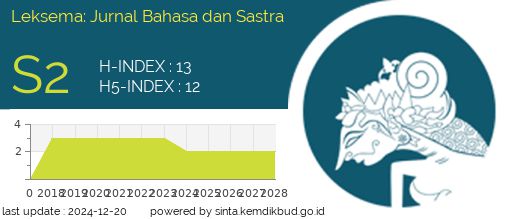STUDENTS’ CONSCIOUSNESS ON LEARNING GRAMMAR IN ENGLISH TUTORIAL CLASS
DOI:
https://doi.org/10.22515/ljbs.v2i2.890Keywords:
consciousness, grade, grammar, improvement, participationAbstract
: Students in higher education are ordered to be competent in English. This happens as the response of high requirement in using English for larger uses nowadays. Consequently, higher education nowadays provides English tutorial to prepare the students to be competent English users, including mastering grammar. This research was conducted in order to discover students’ participation, grade, and score improvement as the aspects of applying consciousness towards English grammar.The research adopted mixed method approach. The researcher collected the data by observation, tests, and questionnaires. The participants were the students in English tutorial class from the Faculty of Islamic Economics and Business and the Faculty of Islamic Education and Teacher Training. The objective of this research are to monitor the students’ sincerity working on the learned lessons and to make senses their performance with the supports of their assessment records. The results showed various dynamics on the students’ existence being part in the lessons.High participation was done by the students along with various grades. All observed students showed positive self-correction and increasing score improvement with their heterogenous mechanisms.This research notices that the students have motivation to be mastered, but their experience and exposure on English grammar affect their assessment results. However, the data reveal that their efforts remain improved as reflected in their track records in the lessons.
Downloads
References
Ahmad, Ismail Sheikh, Hazlina Abdullah, & Muhammad Faizal A Ghani. 2014. “Attitudes and Motivation toward Learning the English Language among Students from Islamic Education System Background: Exploring the Views of Teachers.†Journal of Education and Learning (EduLearn) 8 (3): 195. doi:10.11591/edulearn.v8i3.262
Block, David. 2013. “Issues in Language and Identity Research in Applied Linguistics.†Estudios de LingüÃstica Inglesa Aplicada 13 (13): 11–46. doi:10.12795/elia.2013.i13.01
Graddol, David. 2006. English Next. British Council
Jang, Hyungshim. 2008. “Supporting Students’ Motivation, Engagement, and Learning during an Uninteresting Activity.†Journal of Educational Psychology 100 (4): 798–811. doi:10.1037/a0012841
Jean, Gladys, & Daphnée Simard. 2011. “Grammar Teaching and Learning in L2: Necessary, but Boring?†Foreign Language Annals 44 (3): 467–94. doi:10.1111/j.1944-9720.2011.01143.x
Leech, Geoffrey. 2004. “English as a Global Language.†The Palgrave Handbook of Economics and Language 36: 2077–80. doi:10.1007/978-1-137-32505-1
Liu, Jin Yu, Yu Jung Chang, Fang Ying Yang, & Yu Chih Sun. 2011. “Is What I Need What I Want? Reconceptualising College Students’ Needs in English Courses for General and Specific/Academic Purposes.†Journal of English for Academic Purposes 10 (4). Elsevier Ltd: 271–80. doi:10.1016/j.jeap.2011.09.002
Nelson, Graham. 2011. “Natural Language, Semantic Analysis and Interactive Fiction.†IF Theory Reader, no. April 2005: 141–88. http://inform-fiction.org/manual/if_theory.html
Seidlhofer, B. 2012. “Understanding English as a Lingua Franca.†International Journal of Applied Linguistics 77 (1): 124–28. doi:10.1521/bumc.2013.77.4.413
Serin, Nerguz Bulut, Oǧuz Serin, & Ali Ceylan. 2010. “Affective Characteristics of University Students about English Course and Their Attitude and Thoughts toward the Course.†Procedia - Social and Behavioral Sciences 2 (2): 1936–39. doi:10.1016/j.sbspro.2010.03. 1013
Spradley, JP. 2007. Metode Etnografi (trans, 2nd edition). Yogyakarta: Tiara Wacana
Valdez, Gabriela. 2015. “U.S. Higher Education Classroom Experiences of Undergraduate Chinese International Students.†Journal of International Students 188 (2): 188–200. http://jistudents.org
Downloads
Published
Issue
Section
License
The copyright of the received article shall be assigned to the publisher of the journal. The intended copyright includes the right to publish the article in various forms (including reprints). The journal maintains the publishing rights to published articles.
In line with the license, the authors and users (readers or other researchers) are allowed to share and adapt the material only for non-commercial purposes. In addition, the material must be given appropriate credit, provided with a link to the license, and indicated if changes were made. If authors remix, transform or build upon the material, authors must distribute their contributions under the same license as the original.






